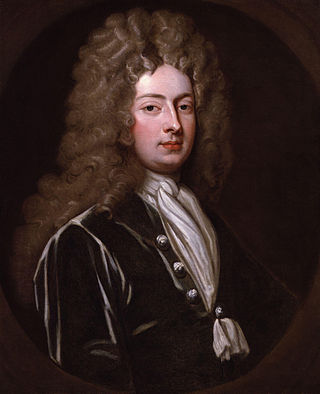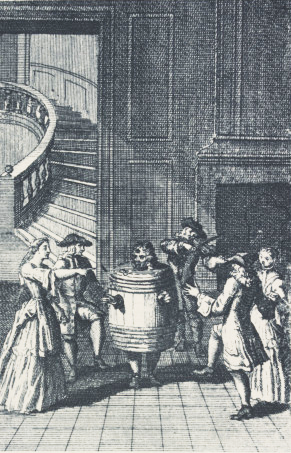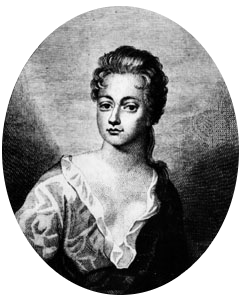Related Research Articles

William Congreve was an English playwright, poet and Whig politician. His works, which form an important component of Restoration literature, were known for their use of satire and the comedy of manners genre. Notable plays he wrote include The Old Bachelor (1693), The Double Dealer (1693), Love for Love (1695), The Mourning Bride (1697) and The Way of the World (1700) which established him a great writer in the genre of comedy of manners. He died in London, and was buried at the Poets' Corner in Westminster Abbey.

Restoration comedy is English comedy written and performed in the Restoration period of 1660–1710. Comedy of manners is used as a synonym for this. After public stage performances were banned for 18 years by the Puritan regime, reopening of the theatres in 1660 marked a renaissance of English drama. Sexually explicit language was encouraged by King Charles II (1660–1685) personally and by the rakish style of his court. Historian George Norman Clark argues:
The best-known fact about the Restoration drama is that it is immoral. The dramatists did not criticize the accepted morality about gambling, drink, love, and pleasure generally, or try, like the dramatists of our own time, to work out their own view of character and conduct. What they did was, according to their respective inclinations, to mock at all restraints. Some were gross, others delicately improper.... The dramatists did not merely say anything they liked: they also intended to glory in it and to shock those who did not like it.

Richard Bentley FRS was an English classical scholar, critic, and theologian. Considered the "founder of historical philology", Bentley is widely credited with establishing the English school of Hellenism. In 1892, A. E. Housman called Bentley "the greatest scholar that England or perhaps that Europe ever bred".
This article contains information about the literary events and publications of 1729.
This article contains information about the literary events and publications of 1761.
This article contains information about the literary events and publications of 1700.
Events from the year 1703 in literature.
This article contains information about the literary events and publications of 1704.
This article contains information about the literary events and publications of 1706.
This article contains information about the literary events and publications of 1701.
This article contains information about the literary events and publications of 1699.
This article contains information about the literary events and publications of 1697.
This article contains information about the literary events and publications of 1694.
This article contains information about the literary events and publications of 1692.

Jeremy Collier was an English theatre critic, non-juror bishop and theologian.

In March 1698, Jeremy Collier published his anti-theatre pamphlet, A Short View of the Immorality and Profaneness of the English Stage; in the pamphlet, Collier attacks a number of playwrights: William Wycherley, John Dryden, William Congreve, John Vanbrugh, and Thomas D'Urfey. Collier attacks rather recent, rather popular comedies from the London stage; he accuses the playwrights of profanity, blasphemy, indecency, and undermining public morality through the sympathetic depiction of vice.

Anne Bracegirdle was an English actress and soprano. Most of the plays she performed in involved singing as well as acting. She often performed music written for her by the composer John Eccles, and also sung music written for her by Henry Purcell. She became particularly well known for the song "I burn" which Eccles originally wrote for Bracegirdle to perform in Thomas D'Urfey's play The Comical History of Don Quixote (1694). She also sang music by Eccles in the play The Richmond Heiress (1693) and in William Congreve opera The Judgment of Paris. In 1706 she starred in Giuseppe Fedeli's opera The Temple of Love.
Mary Kent was an English actress, whose career lasted from 1692 to 1718. Her dates of birth and death are not known. She was the wife of Drury Lane actor Thomas Kent.
Joseph Williams was an English stage actor of the seventeenth and early eighteenth century.
Elizabeth Bowman was an English stage actress of the seventeenth and early eighteenth century. The daughter of Sir Francis Watson, 1st Baronet she was adopted by the actor manager Thomas Betterton. In 1692, she married John Bowman and began acting at Drury Lane the following year as Mrs Bowman. She was a member of the United Company until 1695 then joined Betterton's breakaway at the Lincoln's Inn Fields Theatre.
References
- ↑ Palmer, Alan; Palmer, Veronica (1992). The Chronology of British History. London: Century Ltd. pp. 200–201. ISBN 0-7126-5616-2.
- ↑ Allen Perdue Britton; Irving Lowens (1990). American Sacred Music Imprints, 1698-1810: A Bibliography. American Antiquarian Society. p. 107. ISBN 978-0-912296-95-1.
- ↑ Dr Catie Gill (28 April 2013). Theatre and Culture in Early Modern England, 1650-1737: From Leviathan to Licensing Act. Ashgate Publishing, Ltd. p. 40. ISBN 978-1-4094-7624-5.
- ↑ Antoine Louis PARIS (1843). Le Catalogue des Imprimés de la Bibliothèque de Reims, avec des notices sur les éditions rares, curieuses et singulières, des anecdotes littérares, et la provenance de chaque ouvrage (in French). p. 254.
- ↑ Richard Bentley (1874). Dr. Richard Bentley's Dissertations Upon the Epistles of Phalaris, Themistocles, Socrates, Euripides and Upon the Fables of Aesop. S. Calvary. p. 13.
- ↑ Darryll Grantley, "The Social Geography of London in Restoration Comedy", p.10. Accessed 26 April 2013.
- ↑ Eighteenth Century Women Playwrights. ISBN 978-1-57085-649-5.